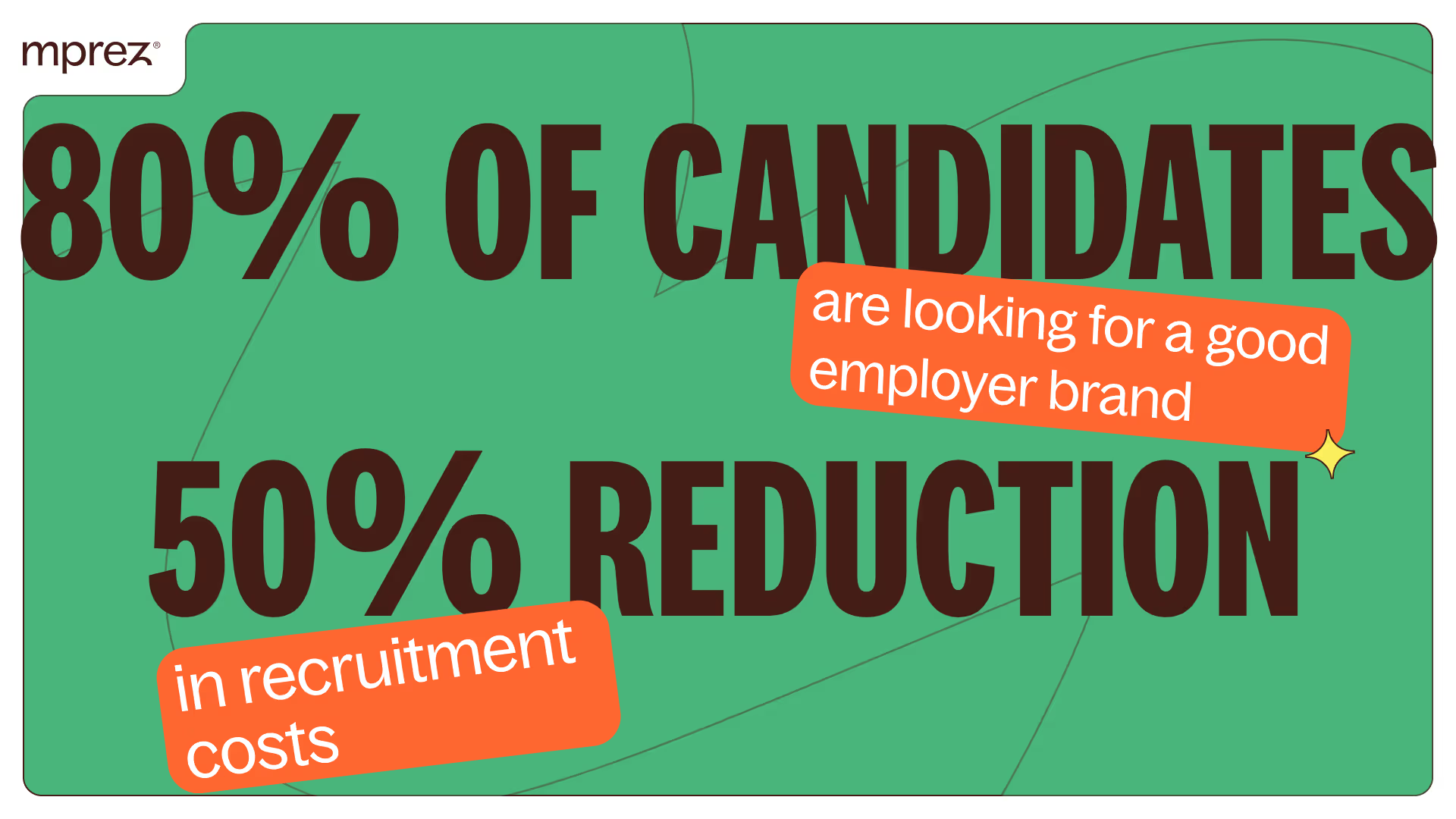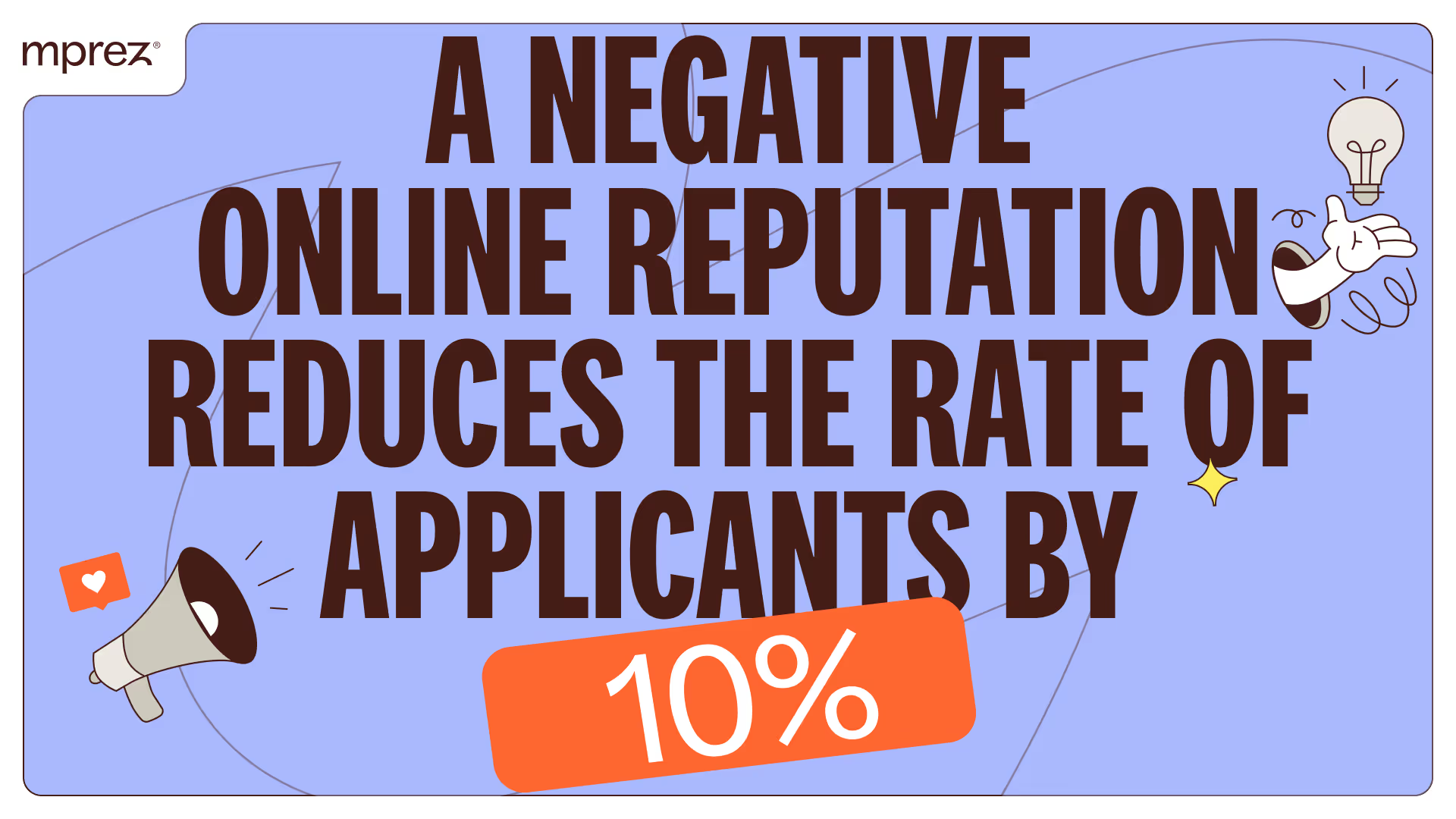Improving your employer brand: the keys to attracting and retaining talent
Discover all the best ways to attract and retain employees

In the current context of the labor market, which can be tense depending on the sector of activity, managing your employer brand well is crucial, both to encourage candidates to apply and to attract the sympathy of customers and their loyalty.
But what really makes an employer brand effective? What are the key elements to master in order to stand out and thrive in a competitive environment? And how can a business not only attract, but also retain talent while cultivating a positive company culture?
We break down the whole question in this article.
Definition: what is employer branding?
The employer brand is the image and reputation of a company as an employer with its employees and potential candidates, but also with a wider audience such as customers, service providers, investors, etc. It is a global approach that brings together the recruitment processes and the satisfaction of candidates (even refused), the management of employees and the well-being at work, and, finally, the reputation of the company through the media, customers, schools, etc. The employer brand is built across the lifespan of a company and can therefore improve or deteriorate depending on the choices made by the structure.
This is an essential fact to keep in mind and to worry about, because poor external exposure will scare away customers and potential collaborators.
Understanding the employer brand
History and evolution: how the employer brand has evolved over the years
The concept of employer brand has evolved significantly over the years. Initially, businesses focused primarily on their commercial brand to attract customers and increase sales. However, with the evolution of the job market and the increasing importance placed on employee well-being, employer branding has become a crucial part of the company's overall strategy. Today, a strong employer brand is perceived as an essential lever for attracting and retaining talent, while strengthening the company's reputation among all its stakeholders and global cohesion.
How does an employer brand differ from a commercial brand
Employer brands and commercial brands, although linked, differ in terms of their goals and their target audiences. The commercial brand aims to attract and retain customers by promoting the company's products or services. In contrast, employer branding focuses on attracting and retaining talent, by promoting the company as an attractive workplace and by valuing corporate culture, values, and opportunities for professional development. A clear distinction between these two concepts is essential for developing effective strategies that meet the specific needs of each audience.
Key components of the employer brand
Key components of a strong employer brand include company values, culture, and online reputation:
- Values : Company values define what is important to the company and serve as a guide for expected employee behaviors. They should be authentic and truly reflect the philosophy of the company.
- Corporate culture : Corporate culture encompasses the practices, habits, and behaviors that prevail within the organization. A positive, inclusive, and engaging culture promotes employee well-being and strengthens their sense of belonging.
- Online reputation : Employee reviews, testimonies and interactions on social networks can strongly influence the perception of the company as an employer. It is therefore important to actively manage this reputation to maintain a positive image.
By understanding and developing these key components, businesses can improve their employer brand, attracting quality talent and retaining current employees.
The benefits of a strong employer brand
Attracting talent
A strong employer brand plays a crucial role in recruiting and retaining talent. When a company is perceived positively by potential candidates, it naturally attracts quality profiles. Candidates are more likely to apply and accept job offers if the employer's image is good.
Indeed, a developed employer brand is a guarantee of the seriousness of a company and its professional conscience, which has the effect of attracting the most qualified candidates. Your influence is increased tenfold and the best profiles will come to your attention, wanting to be part of a reliable and recognized company. Indeed, according to a study published in 2022 by Talent Board, 80% of candidates are actively looking for companies with a solid reputation as an employer. In addition, according to a study conducted by Seekube and LinkedIn, investing in your employer brand would reduce the cost of recruiting for a vacancy by almost 50%, thanks to the spontaneous applications obtained. By increasing your social thinking, you thus broaden your recruitment opportunities towards candidates who adhere to the values of the company.

Reducing turnover
In addition, a solid employer brand helps to reduce turnover because current employees feel valued and engaged. They are more likely to stay with the company for the long term, which reduces the costs of recruiting and training new employees. Employer branding decreases disengagement and reinforces the retention of existing employees. A positive and engaging corporate culture promotes the well-being of employees, which contributes directly to their job satisfaction. In addition, regular recognition of performance and transparency in communication reinforce the sense of belonging and commitment of employees. As a result, employees are less likely to seek opportunities elsewhere, reducing the costs associated with recruiting and training new employees.
Improving productivity
Finally, a strong employer brand has a significant impact on employee motivation and engagement. When a company is viewed positively, its employees feel proud, motivated, and invested in their work. They are more likely to be fully committed to their tasks, to be proactive and to contribute innovative ideas. Recognizing corporate values and a sense of belonging reinforce their intrinsic motivation, which results in better overall productivity. A motivated team is more efficient, which contributes directly to the success of the company. In addition, the work atmosphere is more positive, and this aspect also serves to build loyalty among the payroll. Indeed, the development of employees is a predominant factor in continuous motivation and a desire to do well and to continue the momentum that has been started.
Positioning the company as a leader
To ensure leadership in its sector, a company must cultivate a strong employer brand that reflects its values and commitment to its employees. This includes concrete actions such as the establishment of professional development programs, the promotion of diversity and inclusion, and transparent communication with all stakeholders. By distinguishing itself by a positive corporate culture and by valuing its talents, the company can not only attract the best candidates, but also stand out as an essential reference in its industry. A reputation as a leader reinforces the credibility of the company, its competitiveness and attracts both customers and strategic partners.
How businesses can effectively improve their employer brand
Transparent communication
Communication is the most important thing. If the communication is poor (in one direction or another, ascending or descending), then the employer brand will be affected.
Transparent communication
To boost communication, opt for transparency. This aspect promotes a climate of trust between employers and employees, which is essential for effective collaboration and a positive corporate culture. When a company communicates openly and honestly, it makes its employees feel valued and informed, reducing misunderstandings and rumours. This includes transparency about business goals, strategic decisions, and successes and challenges. By adopting a transparency policy, the company strengthens its employer brand image, which contributes to attracting and retaining talent while improving employee satisfaction and engagement.
Boosting communication channels
Who says communication says efficient channels. You have several possible communication channels in business, from physical channels to digital channels.
Internal corporate channels
Internally, never omit transversal channels, both top-down (employer to employee) and upward (employee to employer).
For top-down internal communication, the tools can be:
- The newsletter, to periodically inform about new advances and achievements, as well as possible changes.
- The company journal, to keep all the changes made up to date.
- The bulletin board, to highlight important events or messages.
For upward communication, you can opt for:
- The idea box, to gather employee proposals in one place (you can choose to anonymize it so that employees feel more free to express their opinions). It can be physical in the workplace, or dematerialized if you have multiple work sites.
- Surveys, to gather impressions about events, changes, or actions to be taken. Employees will feel more included and you will be able to more easily have a “hands-on” contribution from lived realities.
External channels in business
We can easily think that strengthening your employer brand with people outside the company is complicated, however, some channels naturally and simply make it possible to externalize the values of the company and to promote your employer brand.
- Your website is your best friend, a showcase for your company. Your website reflects the identity, values and vision of the company, in particular through a strong graphic and editorial charter. The featured content allows you to learn more about you and to show who you are to the world. You can boost the information transmitted by improving the overall visibility of your site, through optimal natural referencing (SEO), or a paid strategy (SEA) that will boost your online presence.
- Les social networks are now a popular means of communication that can be easily consulted by everyone. It is a channel that costs little, although it can be time-consuming, and offers you the opportunity to portray your values and identity day after day. By creating dynamic and interactive content, you get a solid engagement lever that will then allow you to promote both who you are and what you do. Do not hesitate, on your networks, to let your CSR and ethical actions shine through, your considerations about the quality of life at work, the good atmosphere that reigns in your structure, ecological awareness, the company's commitments at all levels and the entire base of values of society. The aim is to create a positive - but realistic - image of life in your society. Thus, you can concretely discuss events in the life of the company (product launch, team building, exhibition, etc.), the successes obtained (new contracts/customers, hires...), show the company's offices and the work environment, and highlight the employees, and highlight employees (portraits, interviews, etc.), and, of course, share your job offers.
- If you are a small organization, encourage local communication may be a profitable strategy. To work on your local visibility, you can participate in local events such as exhibitions, fairs, sporting events, etc., or even opt for a partnership and become a sponsor of an event. It is a good way to be present on your local fabric and to get noticed positively.

Valuation and recognition
Internal communication also involves remarkable actions. Indeed, if you communicate a lot, but your actions do not support your words, then you will have done this work in vain.
You need to show that you are a good manager and start a positive leadership policy that focuses on employee well-being, trust and appreciation.
Choose soft management methods that will encourage employees to trust you to create a sense of belonging in each employee. Pay attention to work-life balance, for example by allowing remote work for suitable professions. This may require a certain digital transformation, but it is a strategy that will pay off, since your employees will be more efficient, more relaxed and less anxious on a daily basis. On the other hand, the rise of digital tools promotes collaboration while giving everyone the freedom to organize their work, which increases everyone's trust and comfort. Betting on the development of employees is a sure way to boost the employer brand, motivate the workforce and increase overall satisfaction.
The company must also recognize and value exceptional productivity and performance to encourage employees to excel and remain successful. For example, you can set up a system of bonuses based on objectives or even a career plan adapted to each employee. This will encourage employees and engage you in human capital, which will be ideal for your employer brand.
Evaluate your current employer brand
If you don't know where your current employer brand is, you need to assess it to best adapt your actions later on.
Internal Audits
For example, you can start implementing regular internal audits. These audits make it possible to analyze current human resources (HR) and communication practices. The aim is to identify strengths and areas in need of improvement.
Analyzing HR practices includes examining recruitment processes, onboarding new employees, talent management, recognition and reward policies, and workplace wellness initiatives. In parallel, the internal communication audit aims to assess the effectiveness of the communication channels used, the transparency of exchanges between the various hierarchical levels, and the perception of employees concerning the accessibility and clarity of the information shared.
These audits provide a valuable overview and make it possible to implement targeted actions to strengthen the employer brand and improve the employee experience within the company.
Employee feedback
Who better than the employees themselves to talk about how they see your business?
By carrying out internal surveys and polls, employees will be able to address their various concerns and suggestions to you and you will be able to directly know if their commitment and sense of belonging is high or not. If this is not the case, do not scourge anyone: it is simply a sign that decisions need to be made about their happiness at work and their value. By giving employees a voice, you show that the company values everyone's opinions and is ready to take concrete steps to improve well-being at work. The results of these surveys can then be analyzed to implement targeted actions, adapted to the real needs of employees, and thus build a positive and inclusive corporate culture. On a daily basis, employee feedback is the barometer that allows your company to take the temperature of motivation and commitment at work.
Online presence review
The perception of the company on review platforms and social networks is a good way to assess the employer brand. Employee reviews, whether current or former, on sites like Glassdoor or Indeed, provide valuable insights into the work environment and company culture. These are sites that candidates frequently visit and that can influence their decision about a possible application. In addition, the company's activity on social networks, including LinkedIn, Twitter, and Facebook, allows you to see how it interacts with its employees, potential candidates, and the general public. A positive online presence, marked by positive testimonials and transparent communication, strengthens the employer brand and attracts quality talent. On the other hand, negative reviews or poor management of online interactions can damage a company's reputation and deter potential candidates.
If you notice that the online presence is negative and is hurting your business, then you need to take matters into your own hands and act quickly to avoid worsening the situation. Talk to employees if, for example, you notice that no one is sharing company news: this may mean that they do not feel they belong there and/or that the values and actions communicated do not resonate with theirs. If you notice that you have negative reviews on Google, Indeed, or others, take the time to respond to the users who commented to understand their point of view, correct the error and prove that customer and employee satisfaction is one of your priorities.
To finish
In conclusion, a strong employer brand is essential to attract and retain talent in an increasingly competitive job market. It is based on authentic values, a positive corporate culture, and transparent communication. By investing in its employer brand, a company not only improves its image, but also creates a motivating and engaging work environment for its employees. Long-term benefits include better talent retention, increased productivity, and a strengthened position as an industry leader. It is therefore crucial for companies to put in place effective strategies to develop and maintain a solid employer brand, such as audits, digital actions, internal communication tools, etc.
sourcing :
Recruitee — Marque employeur
Wojo — Développer sa marque employeur : 16 leviers à activer
Factorial — Développer sa marque employeur
Great Place to Work — 7 clés pour améliorer sa marque employeur
Greenly — 5 règles d’or pour améliorer sa marque employeur
Ce qu'il faut retenir
Improving your employer brand allows you to:
- Get better engagement on job offers published on social networks
- Lower recruitment costs (time spent, office fees, more qualified candidates, etc.)
- Increase employee engagement
- Reducing turnover and absenteeism
- Improving its influence
- Develop company values



